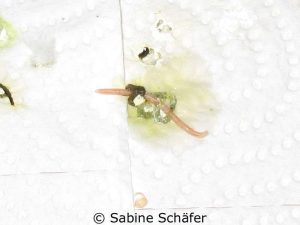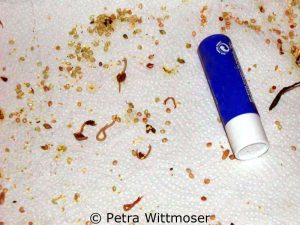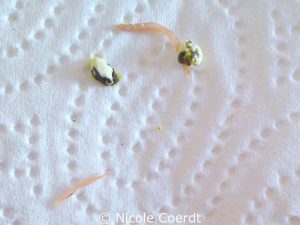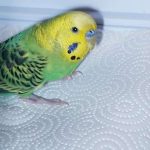- >>
- Birds Online – English
- >>
- Health and diseases
- >>
- Parasitic infestations
- >>
- Roundworms
Roundworms

Inside the bird’s intestines, roundworms of the genus Ascaris can occur. These parasites are also referred to as ascarids and they are so-called internal parasites or endoparasites. If you keep your birds in outdoor aviaries with natural soils, you should always be aware of the risk that the animals can get in touch with roundworms. Under certain circumstances, the eggs of these parasites can be found in the soil, where they can survive for a long time in humid climates. In the heat, drought, and direct sunlight, however, they die off quickly.
Unfortunately, in most cases, it takes quite a while to notice an infestation in birds. An unnoticed infestation can persist over a longer period and the affected birds can spread the parasites to their conspecifics. In the case of a high degree of colonization of the intestine with roundworms, serious complications may suddenly occur. Sometimes these issues can even be fatal. Therefore, every bird owner should be familiar with the topic.
Transmission
If birds eat from the ground of an aviary contaminated with roundworm eggs, they could be swallowed and reach the bird’s digestive tract. In the intestine, the eggs develop into worms up to 35 millimeters long, which in turn produce more eggs. With the feces of an infected bird, the eggs travel to the aviary floor – the cycle is closed. All birds living in the same aviary are therefore potentially at risk of becoming infected.
There is also a great risk for escaped pet birds who have to look for food in nature. They often eat natural seeds from the ground and may thus absorb roundworm eggs, because our native birds are also possible hosts of these parasites. It is therefore important to have any pet bird you captured outside examined for the presence of roundworms in the intestine.
Symptoms

A bird infected with roundworms can be recognized by occasional diarrhoea. In addition, it can lead to severe emaciation. If you take a close look at the abdomen of a sick bird, the swollen intestine is often visible through the thin skin. You can also easily feel them when you touch the bird. This is different in healthy birds, cannot be palpated that easily. In severe cases, the affected birds suffer an intestinal obstruction because of the worms knot. Intestinal obstruction can lead to death within just a few hours and it is very painful for the birds. They suffer severe abdominal cramps and can no longer wean feces.
Also, a roundworm infestation in birds often affects the central nervous system. The worms excrete products of metabolism that are toxic to the birds. In the long run, the bird’s body is increasingly less successful in rendering these toxins harmless what results in damaged nerves. Due to this, it can lead to paralysis as well as disorientation, tremors, and falls.
Sometimes the affected birds spontaneously excrete one or even several worms. So if you spot worms on the bottom of the cage or aviary, you should act quickly and have your birds examined by an avian vet.
Diagnosis and treatment

If one of your birds has excreted a roundworm, it is proof of an infestation. But it’s not always that simple, because often the symptoms are rather non-specific and, above all, worms are rarely excreted. If there is a suspicion of an infestation with roundworms, you should consult an avian vet as soon as possible. The doctor will examine fecal samples under a microscope or send these samples to a laboratory. By doing so, the vet or the lab will look for roundworm eggs.
For this examination, you should collect fresh droppings from a sand-free base and keep them in a small plastic bag or aluminum foil. It is particularly easy to collect fecal samples overnight by placing a folded freezer bag on the bottom of the cage or aviary. In the morning, take the bag that’s now covered with feces out of the cage or aviary. That’s all you have to do to get a suitable sample.
Make sure that you collect several droppings from different birds. Mixed samples like this can be very helpful. And: The more droppings there are for your vet to examine, the greater the probability that in the case of an existing infestation. There will most probably be worm eggs in at least one of the droppings.
If worms or their eggs are detected, the veterinarian will prescribe a special medication. You have to treat your entire flock to get rid of the roundworms. A toxin is usually used that kills the worms but does not harm the birds when dosed correctly. After some time, the therapy must be repeated to kill all life stages of the parasites (eggs, larvae, and adult worms).
The toxin will cause the worms to die in the bird’s body, as a result of which they can no longer hold on to the intestines and are excreted with the feces. They are then later found on the cage or aviary floor – not a pretty sight, but any worm that has died and been excreted by the bird is no longer a threat.
Caution when administering medication
Unfortunately, in the past, problems with deworming birds have occasionally arisen. There were frequent deaths, whole flocks of birds died just a few days after the medication was administered. In most cases that have been reported from Germany, a drug called Panacur was used. In the past, many vets claimed that it is impossible to overdose on Panacur and they claimed it is well tolerated by budgies and other birds. Nevertheless, many birds died after the medication was administered, especially in the early 2000s.
Some bird lovers, including myself, have considered the circumstances under which those cases of deaths could occur. Unfortunately, we could not conclusively explain the cases we took a closer look at, especially since we are not veterinarians. However, we noticed that in many cases deceased birds were examined, whereby enormous liver swelling or even bleeding was detected. Many of the veterinarians who conducted these investigations interpreted this as a sign of severe poisoning. Whether it had been caused by the drug or by the worms who excrete large amounts of toxins in their agony, is not clear. Another source of poison such as a houseplant would also be considered as a possible cause so that the birds would have died almost accidentally after the medication because they had poisoned themselves elsewhere.
In addition, several deceased birds were found to have a severe intestinal infection with aggressive bacteria. Maybe the worm infestation has damaged the intestinal flora and thus enabled the bacteria to proliferate, which may have weakened the birds enormously. It was also discussed whether the intestinal mucosa of the deceased birds may have been too permeable to the drug due to the mechanical irritation by the worms and thus too much of the active ingredient could have entered the bloodstream of the animals. While this is also just a theory, it would be a conceivable cause of death after the administration of the antiparasitic drugs.
Unfortunately, as already mentioned, it has not yet been possible to conclusively clarify why so many birds died after deworming. However, the fact is that finches, for example, are extremely sensitive to Panacur. Parrots are far less sensitive to it.
Due to the potential side effects of the drugs in case of illness, refraining from deworming is still not recommended! It is much more important to ensure that the dose of the anti-worm agent is always calculated exactly and individually during therapy based on the weight of the bird to be treated. This is time-consuming, but it’s the only way to prevent overdoses. If your birds suffer from an infestation with roundworms, in my opinion, it would also make sense to have a fecal sample or a cloaca smear examined for bacteria before starting therapy. If it turns out that there is an intestinal infection in addition to the worm infestation, the disease should also be treated while deworming the birds.
Similar diseases
As a result of several other diseases, there may be swelling of the abdomen in birds. Examples of this are inflammation of the intestine including diarrhoea, tumors in the abdomen, an abdominal hernia or water belly (ascites) as well as in female birds an inflammation of the oviduct. In addition to the diseases mentioned, there are even more. To list them all would go beyond the scope at this point.
Please note: Only an experienced veterinarian can make a reliable diagnosis. In the case of swelling of the abdomen, there is always a need to clarify the cause, because the affected bird may suffer from severe pain.
Roundworms - a case study

